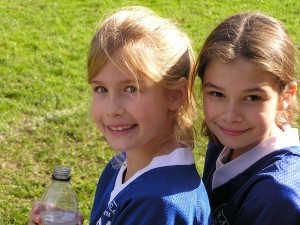S’s of Success in Sports
A year and a half ago I co-wrote an e-book entitled, Pigskin Prep: The Definitive Youth Football Training Program. Although Pigskin Prep is geared towards preparing our youth for the sport of tackle football, many of the concepts apply to all young athletes.
One of the most important concepts in Pigskin Prep is the S’s of Success. Every coach who works with young athletes should follow this.
Kids are kids. The days of lording over them and expecting them to simply “do as you say” are over. Using the framework of the Pillars of Prep (Pigskin Prep), the four S’s of Success for training and coaching youth athletes were born.
Four S’s of Success
S of Success #1: Smile
 This comes first because it is by far the most important S when working with young athletes. If kids do not enjoy what they are doing, they will more often than not tune out their coach and not be attentive during the training session or practice.
This comes first because it is by far the most important S when working with young athletes. If kids do not enjoy what they are doing, they will more often than not tune out their coach and not be attentive during the training session or practice.
Parents will use the disposition of their kids after practice as a thermometer to gauge whether it’s worth the time, commitment and financial investment.
If the perception is that the kids aren’t enjoying it, parents are going to be reluctant in having them continue their involvement with the team or training program.
All kids have the potential to learn and improve their overall physical ability.
What they need is an environment that is both enjoyable and conducive to learning. There is a fine line, however, with how far you can go with this.
Pro Tip: Children still need structure and will benefit most from a systematic approach to training. Show your personality and relate to the kids in your own way. Foster a positive, fun and safe training/learning environment.
Cooperative-based games early in a training session or practice get kids smiling and laughing while simultaneously setting the tone for the remainder of the day.
Pro Tip: Positive affirmation is very important with young athletes. A simple high five or “great job” can go a very long way in building trust. The goal should be intense positivity with your environment and culture.
S of Success #2: Sweat
Sweating is one of the top S’s of Success for youth athletes. The goal of any solid youth fitness program is to prepare children for physical performance!
One of the main goals when training youth athletes is to increase their ability to do more work (work capacity). It may come as a surprise, but this is accomplished by…wait for it…steadily increasing the amount of work they do!
It is perfectly fine if kids are pushed to a point where they’re breathing heavy and feeling uncomfortable. Learning how to get out of one’s comfort zone is an extremely valuable lesson.
One of the biggest mistakes we see when it comes to training children is overworking. There’s a big difference between optimal training and hard training.
Pro Tip: Your goal is to have kids train hard enough to sweat and breath heavily while maintaining the ability to still execute the exercises and/or drills correctly. As soon as form breaks down, you’re wasting time and ingraining flawed movement patterns—which serves no purpose whatsoever.
S of Success #3: Smart
Having a positive and success-minded attitude isn’t something people are just born with—it CAN be taught. In addition to teaching youth athletes the How and Why of training, trainers and coaches have the incredible opportunity to teach them the requisite tools for success in life, not just athletics.
Most children are actually very success hungry. Without experiencing it regularly, they get deflated, which can lead to their self-esteem being negatively affected (Drabik 1996).
This is NOT a rationale for the “everyone gets a trophy” mentality.
Learning that failure is real and loss does happen is equally important for the overall development of a child.
Pro Tip: Finding the balance and challenging kids creates opportunities for them to experience success on a regular basis. Success begets success.
The more success children have, the more of it they want.
Check out Our FREE Mental Toughness Checklist today.

S of Success #4: Snack
 Nutrition is critical for youth athletes. In their formative years, the majority of a child’s nutritional habits will be set.
Nutrition is critical for youth athletes. In their formative years, the majority of a child’s nutritional habits will be set.
In addition to setting the foundation for a healthy life, kids need to learn that what they’re putting in their body can affect their performance both positively and negatively.
Below are a few points one can use to set the foundation for a healthy life when it comes to real food:
- Just eat real food
- Minimize processed sugars
- Consume protein in every meal
- Eat every 3-4 hours
- Understand how proteins, fats and carbohydrates function in relation to your body
“The price of success is hard work, dedication to the job at hand, and the determination that whether we win or lose, we have applied the best of ourselves to the task at hand.”
— Vince Lombardi
About the Author: Jeffrey King
 Jeffrey King, MA, CSCS
Jeffrey King, MA, CSCS
– Director of Athletics at Fitness Quest 10
– Co-author of Pigskin Prep: The Definitive Youth Football Training Program
 Julie is the Executive Director of the International Youth Conditioning Association (IYCA). She grew up as an athlete and played collegiate softball at Juniata College. She currently owns and operates her own youth fitness business pouring into young athletes. Her areas of expertise are youth sport performance, youth fitness business and softball training/instruction. Julie grew up on a dairy farm and can challenge the best of the best in a cow-milking contest. 😉
Julie is the Executive Director of the International Youth Conditioning Association (IYCA). She grew up as an athlete and played collegiate softball at Juniata College. She currently owns and operates her own youth fitness business pouring into young athletes. Her areas of expertise are youth sport performance, youth fitness business and softball training/instruction. Julie grew up on a dairy farm and can challenge the best of the best in a cow-milking contest. 😉



